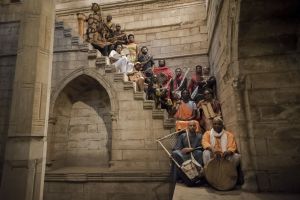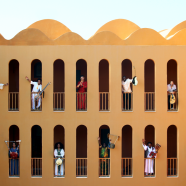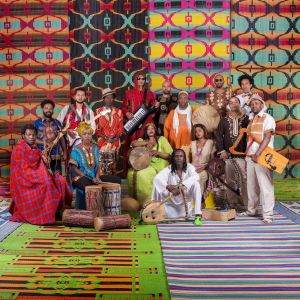The Nile Project: Interview with Mina Girgis
 When we catch up with them in Raleigh, North Carolina, where they are in residence at North Carolina State University, the members of the Nile Project band are two and a half months into their tour of the United States. What do they miss most from home? They ponder for a moment. “Other than our families? Our traditional food,” they all agree. All the musicians speak English and several speak Arabic as a native or acquired language. The main female vocalist, Salamnesh Zamani, is Ethiopian, and the main male vocalist, Salib, is Egyptian. Two of the band members are Egyptian, one Nubian (upper Egypt), one Eritrean, one of mixed Eritrean and Egyptian parentage, and one Kenyan. They play traditional instruments like the kirar (electric lyre) and the kawal, and some double as vocalists.
When we catch up with them in Raleigh, North Carolina, where they are in residence at North Carolina State University, the members of the Nile Project band are two and a half months into their tour of the United States. What do they miss most from home? They ponder for a moment. “Other than our families? Our traditional food,” they all agree. All the musicians speak English and several speak Arabic as a native or acquired language. The main female vocalist, Salamnesh Zamani, is Ethiopian, and the main male vocalist, Salib, is Egyptian. Two of the band members are Egyptian, one Nubian (upper Egypt), one Eritrean, one of mixed Eritrean and Egyptian parentage, and one Kenyan. They play traditional instruments like the kirar (electric lyre) and the kawal, and some double as vocalists.
Since the members of the band don’t necessarily have much time to practice together, they need to work out some initial musical issues. Their music blends several traditions, African, Arabic, and Western. Arabic music has a quarter note, and Eritrean music uses a different scale. But sooner or later they all come together on the same page, and their performance onstage is seamless and joyful.
Their tour of the United States has been an adventure, with some memorable moments: Eritrean vocalist/musician Ibrahim Fanous won a thousand dollars at a Reno Casino. But rare frivolous interludes apart, the Nile Project has a serious purpose.
In an interview for South Writ Large, Nile Project producer and CEO Mina Girgis emphasizes that music is only a gateway to the higher purpose of the project: conflict transformation among Nile riparian countries, as well as environmental conservation and cultural outreach.
South Writ Large: Tell us about your background and your inspiration to found The Nile Project.
Mina Girgis: I was born in Paris (to Egyptian parents), grew up in Cairo, where I attended a Jesuit school, and later studied ethnomusicology at Florida State University and UC Santa Barbara. When the Arab Spring revolution started in Egypt in January 2011, I was looking for a way to engage with whatever social movement was happening. I was inspired to found the Nile Project, a group of musicians from up and down the Nile basin. The Nile Project was one of the rare idealistic projects that bore fruit and survived from that period of the revolution. It was important to make Egyptians aware of the water conflict brewing in the background with upriver countries and to provide a platform for engagement in innovative solutions. This water problem has proved over the past five or six years to be a long-term challenge.
Ethiopia had talked about building a dam that would threaten the water supply to the countries downriver. Can you tell us a little about the importance of the Nile Project in that context?
Ethiopia is the water tower of Africa, but it had never had the opportunity to build its infrastructure in hydraulic or electric power. So it was natural that it should want to build a dam on the Blue Nile. Historically Egypt and Sudan have claimed the lion’s share of the water according to earlier treaties. So the potential for conflict is clear. Both Egypt and Ethiopia have about the same populations, about 90 million.
You have mentioned that it has been about two years ago since the Nile Project began to concentrate on water resource issues and conflicts in the Nile basin. Before that it was known for the music. How has it developed?
We love the music but we have always wanted it to have an impact on how these countries think of themselves as riparian neighbors along the Nile, how each of us can become a better Nile citizen. Water is a multidisciplinary problem, so in the past two years we have been looking to translate the music into other domains, focusing on universities, on students and faculty. Professors are working on collaborative research among Nile countries and students are working on Nile Project university chapters and working with local communities on water sustainability projects. We have partnerships with universities in several countries and twenty-four year-long student scholarships.
Where does your funding come from for university outreach?
We have different sources with different priorities in different geographical territories, so we have different donors from different countries, including Swiss and Dutch.
Have you made the links you were hoping for here at NC State University and with which departments?
We have collaborated with the African Studies department, as well as the Water Resource Institute here on campus. It has been one of the best universities to work with.
Fascinating that you’ve been able to link the work on the river basins here in North Carolina with the great river Nile in Africa. You’ve expanded tremendously from your music roots to managing an international interdisciplinary project almost as much environmental as musical. It must have been challenging?
It has definitely been an extreme learning experience, a stretching intellectual experience.
For more information and to listen to their music, visit their website: http://nileproject.org/









Thoroughly enjoyed Mina’s pre concert talk at NC State. Very well informed on an often overlooked, in the West, topic as well as being very eloquent. The musicians, their instruments and their blending together was fascinating and memorable. So happy to have had a chance to see and hear them live!